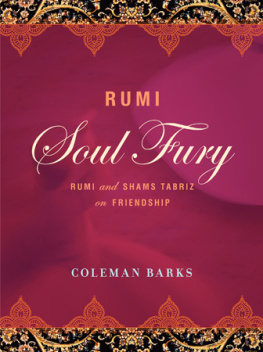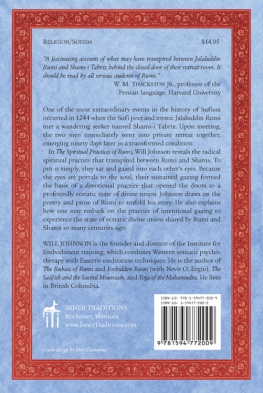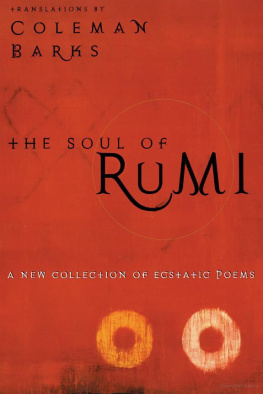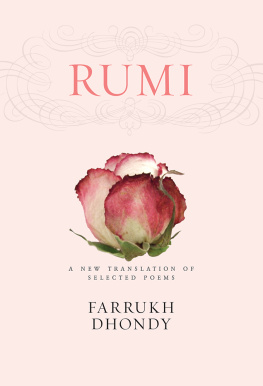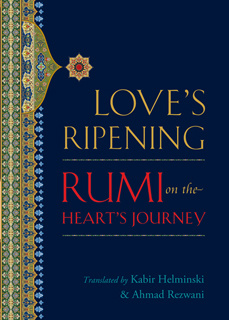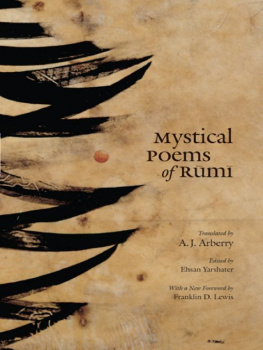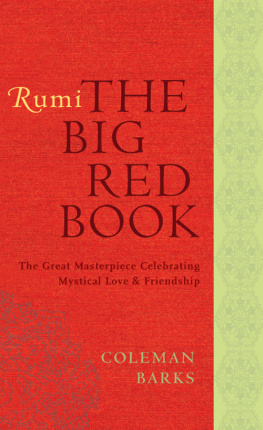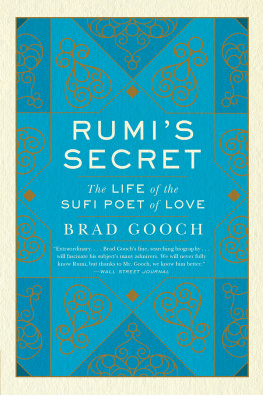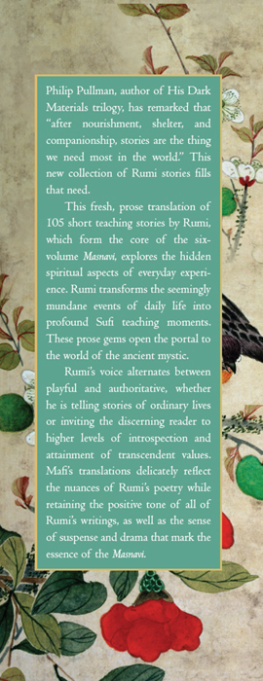THE LOVE RELIGION, WILD SOULBOOKS, AND WHAT IS T he story of Rumis life is well known. Born in the early thirteenth century into a lineage of scholars and mystics in Balkh (then at the eastern edge of the Persian empire, now in northern Afghanistan), he left as a boy with his family just ahead of the advancing armies of Genghis Khan. After several years of traveling they settled in Konya (south-central Turkey), where Rumi became the leader, after his father Bahauddins death, of a dervish learning community. His life and consciousness changed radically after the meeting in 1244 with his teacher and friend, Shams Tabriz, a wandering meditator of fiery force and originality. The inner work that Shams did with Rumi and Rumi with Shams produced the poetry. It springs from their friendship.
The words that came so spontaneously carry a broad range of religious awareness: the meditative silence and no-mind of Zen, the open heart and compassion of Jesus, the stern discipline of Muhammad, the convivial humor of Taoists, the crazy wisdom and bright intelligence of the Jewish Hassidic masters. Rumi is a planetary poet, loved the world over for the grandeur of his surrender and for the freedom and grace of his poetry. He was nurtured within the Islamic tradition, the Persian language, and a long line of Sufis, but it is his connection with Shams of Tabriz that lets his work transcend definition and doctrine. The poetry feels as though it belongs to all. When he died in 1273, members of every religion came to the funeral. Wherever you stand, his words deepen your connection to the mystery of being alive.
The wide use of Rumi texts in multicultural gatherings, that vivid and characterizing feature of our landscape, has roots, I believe, in the continuous human search for true identity, for soul. Whatever the soul is, it does get fed by practices that honor its presence. Such practices might include walking for a lot of people in these sedentary times, and also the habit of reading a wild soulbook. Those volumes vary with each taste and need. Montaignes Essays for Emerson, Rousseau for Hazlitt, Turgenevs A Sportsmans Sketches for Hemingway, Chekhov for Raymond Carver. Dickens for Faulkner.
Taoist poetry for Robert Bly. G. K. Chesterton for Andrew Dick. Benedetto Croce for Rabindranath Tagore. D. H. H.
Lawrences poetry for Galway Kinnell, P. G. Wodehouse for Robert West, Goethes Letters to Eckermann for my sister Betsy (Elizabeth Cox), Henri Nouwen for my brother Herb, Meister Eckhart for James Wright, Lord Jim for Annie Dillard, Thornton Wilder for Ed Hicks, Ruskin and Crabb Robinson for Mary Oliver, Ibn Arabi for Ed Hirsch. Marks Gospel and Hardys poetry for Donald Hall. Euripides for C. S.
Lewis, Hamlet and King Lear for Ellen Williams. For Elizabeth Bishop it was a rocklike, very dull second volume of a study on some industrial technique, for Marianne Moore, a Saturday morning lecture on Java. I wonder what would be a wild soulbook for Harry Crews. James Agee? For me, since 1976, I have felt the bright wind coming from Rumi. The Shams and The Masnavi. 1 I devised a soulbook practice for myself that eventually became this Rumi work and play.
After a day of teaching sophomore literature at a universitythis was in September 1976I would walk to the Bluebird Restaurant, have some hot tea, mull an oceanic page or two of Arberrys translations, and rephrase a section into a free-verse poem with a title. I was trying to reenter the trance of the poem and get the feel of its creative freedom. Rumi has not been my only soulbook these last thirty years. Theres also Garca Mrquez, Colin Wilson, Cormac McCarthy, Ryokan, Edwin Muir, Henry Miller, James Dickey, Gary Snyder, Whitman, and Charlie Smiths poetry. This year it is bird callings, and I refuse to explain. Roy Ashley taught us this Emily Dickinson in high school.
Some keep the Sabbath going to Church I keep it, staying at Home With a Bobolink for a Chorister And an Orchard, for a Dome. Some keep the Sabbath in Surplice I, just wear my Wings And instead of tolling the bell, for Church, Our little Sextonsings. God preaches, a noted Clergyman And the sermon is never long, So instead of getting to Heaven, at last Im going, all along. Roys voice had the conviction of Emilys truth because he lived it, keeping not only the Sabbath but every late afternoon in a sacred solitude, walking and bird-whistling his spontaneous compositions, going along as he did. I grew up on the campus of a boys boarding school where my father was headmaster. Mr.
Ashley lived in an apartment near ours and would stroll his whistling past our screen porch. Unselfconscious, virtuoso, operatic, impersonal, poignantI have never heard anything like that trilling. People used to whistle in public more than they do now. Roy Ashley seemed not to claim his music, and only rarely did anyone speak of it, never to interrupt. That strange, uncommon human birdsong was a teaching whole unto itself. Thomas Mann was his soulbook genius, I think: The Magic Mountain and Buddenbrooks.
The same year that I first heard Emilys call to churchlessness, 1952, I heard another call too. The Billy Graham Crusade came to town and I went up front for the invitation. Under the sweet counsel of a man named Chuck Bovee, I began a program of memorizing Bible verses, two hundred and twenty-seven of them, all from the King James. It was a profound love for a soulbook, the New Testament. Les Misrables and The Return of the Native were other soulbooks for me then, at fifteen. I carried whatever group of twenty-five New Testament verses I was working on in a black leather packet in my back pocket.
One day when I was scuffling with my archrival, Billy D. Pettway, the verse wallet fell to the ground. He picked it up. Whats this? Rubbers? There was no explanation for the weird spirit-longing leap I had taken. Bible verses Im memorizing, said I in dismay. Now I have made a pack of poetry lines for my teenage granddaughter Briny.
Shakespeare, Blake, Dickinson, Mary Oliver, Keats, Galway Kinnell, Mark Twain. For this open-air sanctuary that a lot of us live in, without buildings, or doctrine, or clergy, without silsila (lineage), or hierarchy, in an experiment to live not so much without religion as in friendship with all three hundred of them, and all literatures too. It is a brave try for openness and fresh inspiration.2 It is what sent Whitman out walking around Brooklyn. His mother said, He goes out and he comes back in; thats all he does. It is what prompted Thoreaus rambling retreat to Walden Pond. It is Huck floating on the river at night.
Melville looks out his study window in the Berkshires and writes the ocean of Moby Dick. Jake Barnes in Hemingways The Sun Also Rises slips into an old Spanish church to listen to his thoughts. Wallace Stevens speaks from inside the intensest rendezvous, where God and the imagination are one. Joseph Campbell follows his bliss, researching myth and symbol in the New York Public Library. Gary Snyder works on an ax handle in the high Sierra. Annie Dillard stares down into Tinker Creek.
REMs Michael Stipe stands on stage, Losing my religion. Iris DeMent suggests that we Let the mystery be. All are participating in this global amateur production. We are lucky to have so many luminous figures in this country, but this lineage is not American. It comes down through such varied innumerable strands that it cannot be called a lineage at all. The records of wandering kept by Basho, Cervantes, Homer, and Allan Ginsberg.
Mary Olivers faithful early morning walks with a rainproof surveyors notebook in her hip pocket. John Muir and Audubon. Anyone who heads out to see what happens, just to enjoy the trip. Neednt go far, neednt leave town. Rumi says that merely being in a body and sentient is a state of pure rapture. Form is ecstatic.

